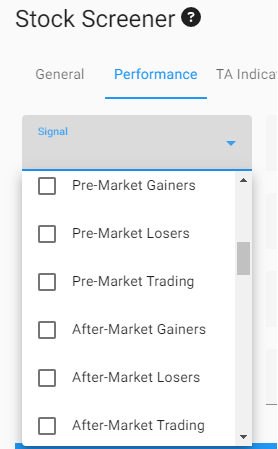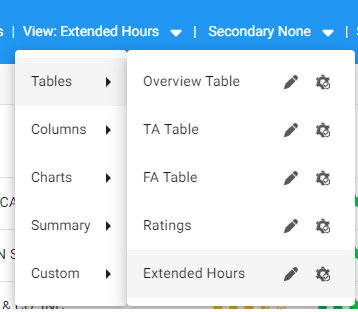Pre-Market and After Hours Stock Screener
By Kristoff De Turck - reviewed by Aldwin Keppens
Last update: Apr 19, 2024
The US Markets (NYSE, NASDAQ and AMEX) have the concept of Pre-Market and After Hours trading. This allows you to buy or sell stocks listed on these exchanges before or after the official trading hours. It should be taken into account that during the so called extended hours, the market is typically less liquid and is easily manipulated. If happens often that a pre market move is not confirmed once the real market opens.
The Stock Screener allows you to screen on Pre-Market or After Hours activity. On the Performance tab, under signal there are 6 pre-defined filters available. Note that these screens will only give results during the extended hours.

We see:
- Pre-Market Gainers: filter stocks which are gaining at least 2 percent in the currently active pre-market session.
- Pre-Market Losers: filter stocks which are losing at least 2 percent in the currently active pre-market session.
- Pre-Market Trading: filter stocks which are active in the current pre-market session.
- After-Market Gainers: filter stocks which are gaining at least 2 percent in the currently active after-market session.
- After-Market Losers: filter stocks which are losing at least 2 percent in the currently active after-market session.
- After-Market Trading: filter stocks which are active in the current after-market session.

To see the extended hours quotes and volume, you should select the 'Extended hours' view in the stock screener. Note that you can edit the view to your own needs if required.
Pre-Market Movers Screen
This screen will find all stocks which are at least 2% up in pre-market trading.
Pre-Market Losers Screen
This screen will find all stocks which are at least 2% down in pre-market trading.
Pre-Market Most Active Screen
This screen will find all stocks which are active in pre-market trading, sorted by pre-market volume.
After Hours Movers Screen
This screen will find all stocks which are at least 2% up in after hours trading.
After Hours Losers Screen
This screen will find all stocks which are at least 2% down in after hours trading.
After Hours Most Active Screen
This screen will find all stocks which are active in after hourstrading, sorted by after-market volume.
Market Overview pages.
For a quick list of the top pre- and after-market movers you can check the market overview pages:
From these lists you can click through to the stock screener to get the full list.
Custom Pre- or After hours Screen
On the 'Custom' tab of the screener you can create custom screens by using the security properties. This could be useful when you want to do extended hours screens which differ from the predefined filters. The following properties can be of interest:
- % Change (Pre Market): The Pre Market Percentage Change.
- Change (Pre Market): The Pre Market Change.
- Price (Pre Market): The Pre Market Price.
- Volume(Pre-Market): The volume in pre-market trading
- % Change (After Market): The After Market Percentage Change.
- Change (After Market): The After Market Change.
- Price (After Market): The After Market Price.
- Volume (After-Market): The volume in after-market trading
As you can see, custom expressions allow you to take also the extended hours volume into account, which could be interesting to find stocks which are reacting on news. You can compare the volume either with an absolute number or with the average daily volume during the regular session.





